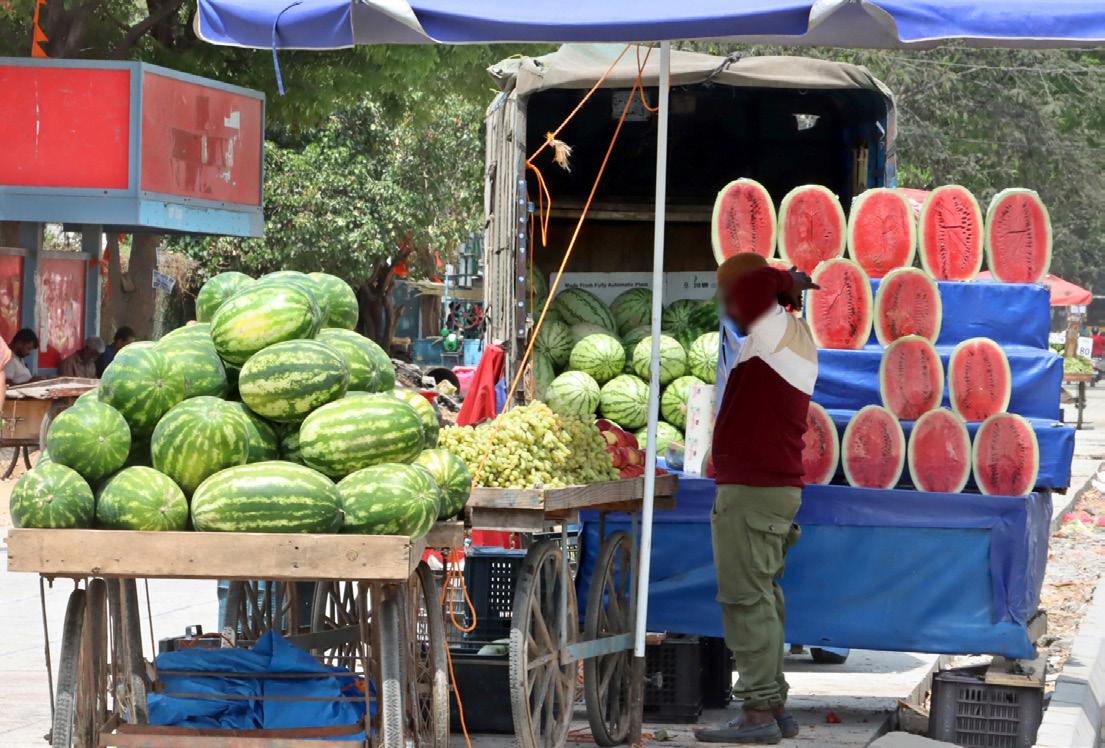
Health officials warn against watermelon adulteration amid cancer concerns
Bengaluru: While summer brings sweltering heat, one of its few delights is the refreshing and hydrating watermelon. Packed with nutrients, this juicy fruit helps keep the body cool and replenished. However, not all watermelons are as healthy as they seem. With growing concerns over food adulteration, there is a possibility that the watermelon you enjoy may be artificially enhanced with harmful chemicals. Health officials have raised concerns over suspected watermelon adulteration after reports surfaced of artificial red dye being used to enhance the fruit’s colour.
After an alleged complaint from a resident who claimed red dyes were used in watermelons, food safety officers launched an investigation, with reports suggesting that some traders use chemicals like nitrogen and oxytocin to accelerate fruit growth. Additionally, substances such as chromate, menthol yellow, and Sudan red dye are allegedly being used to enhance the fruit’s colour artificially. Authorities have urged consumers to remain vigilant and report any suspected cases of food adulteration. With rising concerns over food safety, they have intensified monitoring to prevent harmful chemicals from entering the food supply.
Dr. Vinay Munikoty Venkatesh, consultant paediatric haematology oncology and BMT at Manipal Hospital, Yeshwantpur, expressed concern over the use of artificial colouring agents in food. "As a paediatric oncologist, I have seen a rising number of childhood cancer cases. While improved diagnostics play a role, we cannot ignore the fact that children today are exposed to an environment that may contribute to the onset of cancer. Brightly coloured foods often attract children, but many of these artificial colours contain substances that could be potentially carcinogenic," he said.
In recent years, regulatory authorities have banned harmful artificial colouring agents like Rhodamine due to concerns about their carcinogenic properties. Dr Venkatesh said, "Substances like Sunset Yellow, Allura Red, Brilliant Blue, and Tartrazine are commonly used in food products to enhance their appeal, but they may disrupt DNA repair mechanisms, increasing the risk of cancer.
Although conclusive proof is still being studied, the potential risks are significant." Experts emphasised the importance of people, especially children, consuming natural food items. "It is crucial for parents and caregivers to be aware of these dangers. Not only does artificial colouring pose a cancer risk, but it may also contribute to allergies and hyperactivity in children. Ensuring a healthy diet can help prevent long-term health complications," he warned.
How to figure 'bad apples' out, you may ask: Last year, the Food Safety and Standards Authority of India (FSSAI) highlighted the widespread use of erythrosine, a harmful synthetic dye, in watermelons to enhance their colour. To raise awareness and help consumers detect adulteration, the FSSAI released a detailed video demonstrating a simple test.
As per the video, those interested can check for erythrosine by cutting the watermelon in half and pressing a cotton ball against the pulp. If the cotton ball turns red, it indicates the presence of the artificial dye, signalling potential adulteration. Authorities have urged consumers to remain vigilant and report any suspected cases of food adulteration. With growing concerns over food safety, officials are intensifying monitoring efforts to prevent harmful chemicals from entering the food supply.
 English daily published in Bengaluru & Doha
English daily published in Bengaluru & Doha






